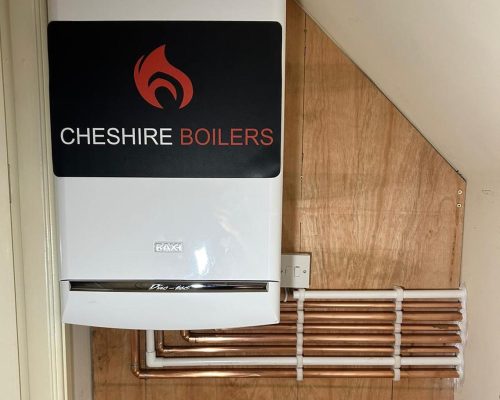Common boiler problems and how to troubleshoot them
Here at Cheshire Boilers, we understand that when you have a problem with your boiler or central heating system you don’t always know where to start on getting it working again.
In many homes and buildings, the boiler plays a crucial role in producing heat and hot water for everyday use. Boilers, like any other piece of mechanical equipment, may run into issues. Here are some typical boiler issues and solutions:

No heat or hot water:
If your boiler isn’t generating heat or hot water, there could be a few causes, including a broken thermostat, inadequate water pressure, or a defective pilot light. Verify the thermostat settings, confirm that the water pressure is within the acceptable range of 1 to 1.5 bar, and confirm that the pilot light is on. If none of these solutions resolve the issue, you might need to contact a qualified specialist to identify and resolve it.
Radiators not heating:
If your radiators aren’t heating up effectively, a build-up of sludge or air in the system may be to blame. Radiators should be bled to release any trapped air, and the system should be power flushed to get rid of any sludge accumulation. Another part could be the pump not working properly so it is not sending the water round the system correctly, normally if your radiators upstairs are hot and downstairs is cold this is a good sign to show that the pump is not pumping correctly.
Heating unevenly:
If your boiler is heating some rooms in your house more than others, there may be an issue with the water circulation in the system this can be a problem with the central heating pump, air in the radiators, Motorised valve is stuck or a build-up of sludge in the pipes. Service the system to guarantee appropriate water circulation and think about power flushing the pipes to get rid of any sludge build-up.
Boiler keeps shutting off:
A broken thermostat, pressure valve, or accumulation of junk in the system could be to blame for a boiler that keeps shutting off. Consider having the system serviced to clear out any debris after checking the thermostat and pressure valve to see if they need to be replaced.
Strange Noises:
Boilers can create a variety of odd noises, including whistling, slamming, and gurgling. Numerous problems, including air in the system, low water pressure, or a broken pump, could be to blame for these noises. Check the water pressure, bleed the radiators to eliminate air from the system and inspect the pump for any obvious symptoms of damage.
Failure of pilot light:
The thermocouple may be the cause of your boiler’s pilot light failing to stay lit. This little mechanism detects heat from the pilot light and tells the gas valve to remain open. If the thermocouple is broken, it won’t provide the signal, which will cause the gas valve to close and extinguish the pilot light. To solve the issue, swap out the thermocouple that will need a qualified engineer to replace it.
Leaks:
If you see water collecting near your boiler, there may be a leak. To try and locate the leak’s source, inspect the pipes and valves near the boiler. You might be able to stop a little leak by tightening a valve or changing a gasket. However, you might need to call an expert to address a more major leak.
Odours:
If your boiler is emitting strange odours or scents, there may be a gas leak in the system or a build-up of dust or debris. Call a qualified expert right away and shut off the boiler if you think there might be a gas leak and ring 0800 111 999. Have the system serviced and cleaned if dust or other debris is the cause of the issue.
Low water pressure:
If your boiler’s water pressure is too low, it can lead to several issues, including subpar heating performance or a shortage of hot water. To determine whether the pressure is within the recommended range, check the pressure gauge on your boiler. You might need to top up the system by adding more water if it’s too low.
High pressure:
If your boiler’s pressure is too high, it could harm the system and potentially be dangerous. To determine whether the pressure is within the recommended range, check the pressure gauge on your boiler. If it’s too high, normally above 2 bar or the red zone, you might need to bleed the radiators to let some pressure out or get in touch with a qualified engineer to fix the problem.
Boiler won't turn on:
The thermostat, pressure valve, printed circuit board or electrical supply may be at fault if your boiler won’t turn on at all. Make sure the electrical supply to the boiler is operating properly and inspect the thermostat and pressure valve to see if they need to be changed. If the issue continues, get help from a qualified technician.
Kettling sounds:
A build-up of limescale in the system may be the cause of a loud rumbling or pounding noise coming from your boiler. This might result in water getting trapped and boiling, which would make noise. Have the system power flushed to get rid of any built-up limescale.
Frozen pipes:
When it’s cold outside, the pipes in your boiler may freeze, which may stop the system from functioning properly. If the pipes are frozen, check them and defrost them with a hot water bottle or hair dryer. Consider insulating your pipes or keeping your heating on low throughout the winter to avoid frozen pipes in the future.
Pump noise:
If the pump in your boiler is creating a loud, screeching noise, there may be an issue with the bearings or the impeller. To decide whether the pump needs to be fixed or replaced, have the system serviced and examined by a qualified specialist.
Carbon monoxide alarm beeping:
A dangerous health risk can arise from carbon monoxide, a colourless, odourless gas that can be created by malfunctioning boilers. Install a carbon monoxide detector in your house and routinely get the system serviced to make sure it’s operating securely and effectively. If you already have an alarm and it is beeping this is a sign that there is a carbon monoxide leak, quickly open all the windows and leave the room. Then call a qualified engineer to find the problem.
If you are unsure how to solve a problem with your boiler, or not comfortable doing it yourself. Please ring a professional for assistance so they can identify the issue and make safe, efficient repairs to get your system operating again or complete our contact form and we will get an engineer out to you.

